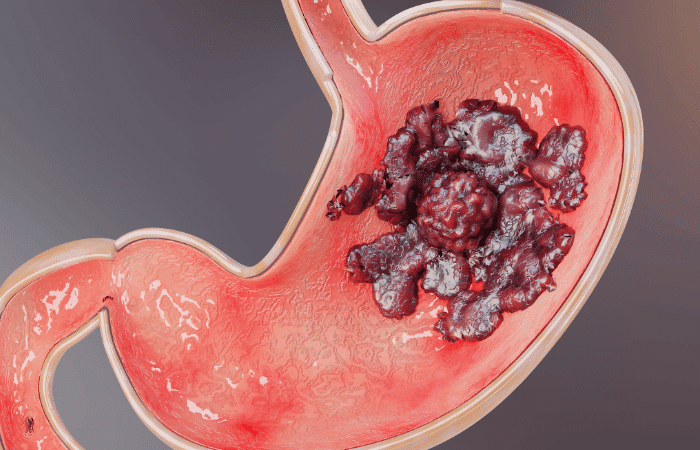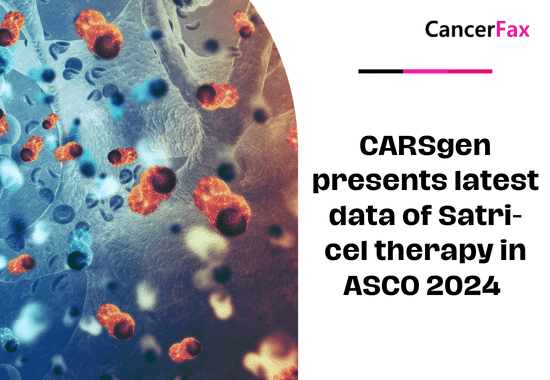Results of SATRi-cel therapy
CARsgen Therapeutics Holdings Limited (Stock Code: 2171.HK) has released the latest findings from the investigator-initiated trial CT041-CG4006 (NCT03874897) of satricabtagene autoleucel (“satri-cel”, CT041). The trial focused on evaluating the effectiveness of this autologous CAR T-cell product candidate against Claudin 18.2 in the treatment of hematologic malignancies and solid tumors.
The final follow-up results of the trial were published in Nature Medicine on June 3, 2024. The data were presented orally at the 2024 American Society of Clinical Oncology (“ASCO”) Annual Meeting on June 3, 2024, from 12:30 pm to 3:30 pm, Eastern Daylight Time.
Additional information has been published on the official company website at https://www.carsgen.com.
The study published in Nature Medicine was titled “Claudin18.2-specific CAR T Cells in gastrointestinal cancers: phase 1 trial final results.”.
The abstract presented at the 2024 ASCO Annual Meeting was titled “Claudin18.2-Targeted Chimeric Antigen Receptor T Cell Therapy for Patients with Gastrointestinal Cancers: Final Results of CT041-CG4006 Phase 1 Trial”.
The main person in charge of this study at Beijing Cancer Hospital, Professor Lin Shen, said that Satri-cel has shown promising results in helping people with advanced gastrointestinal cancers that are positive for Claudin 18.2, especially those with gastric cancer or gastroesophageal junction cancer. This work represents notable progress in the domain of CAR T-cell treatment for solid malignancies.
It indicates that CAR T-cell therapy has the capacity to revolutionize current treatment approaches and offers significant benchmarks for future groundbreaking research. In the future, we expect that additional clinical trials and studies will confirm and improve this groundbreaking medicine, allowing it to help a wider range of patients as quickly as feasible.
Dr. Zonghai Li, the Founder, Chairman of the Board, Chief Executive Officer, and Chief Scientific Officer of CARsgen Therapeutics, expressed his satisfaction in announcing that the conclusive findings of the CT041-CG4006 study have been officially published in the esteemed journal Nature Medicine and presented orally at the 2024 ASCO Annual Meeting. This study is a noteworthy achievement in the realm of CAR T-cell treatment for solid tumors, showcasing the promising safety and effectiveness of satri-cel.
We express our sincere gratitude to the investigators for their long-standing commitment, and to the patients and their families for their confidence and assistance. Our objective is to enhance the available therapeutic options for patients. We are committed to furthering the worldwide clinical development of satri-cel, a cutting-edge CAR T-cell therapy. Our aim is to extend the benefits of this therapy to a larger number of patients with gastric, pancreatic, and other gastrointestinal malignancies.
Satri-cel therapy: CAR T-Cell therapy for solid tumors
Satri-cel is a potential first-in-class global autologous CAR T-cell product candidate targeting the Claudin18.2 protein. Satri-cel is a drug specifically designed to treat solid tumors that are positive for Claudin18.2. Its main target is gastric cancer/gastroesophageal junction cancer (GC/GEJ) and pancreatic cancer (PC).

The ongoing trials consist of investigator-initiated trials (CT041-CG4006, NCT03874897), a confirmatory Phase II clinical trial for advanced GC/GEJ in China (CT041-ST-01, NCT04581473), a Phase I clinical trial for PC adjuvant therapy in China (CT041-ST-05, NCT05911217), and a Phase 1b/2 clinical trial for advanced gastric or pancreatic adenocarcinoma in North America (CT041-ST-02, NCT04404595).
Satri-cel received the Regenerative Medicine Advanced Therapy (RMAT) designation from the U.S. FDA in January 2022 for treating advanced GC/GEJ with Claudin18.2-positive tumors. It also obtained PRIME eligibility from the EMA in November 2021 for treating advanced gastric cancer. Satri-cel obtained Orphan Drug designation from the U.S. FDA in 2020 for treating GC/GEJ and acquired an Orphan Medicinal Product designation from the EMA in 2021 for the treatment of advanced gastric cancer.
CARsgen Therapeutics Holdings Limited
CARsgen is a biopharmaceutical business that operates in both China and the U.S. Its primary focus is on developing advanced CAR T-cell treatments for the treatment of blood cancers and solid tumors. CARsgen has created an extensive platform for researching and developing CAR T-cells, which includes identifying targets, developing new CAR T-cells, conducting clinical studies, and producing them on a large scale for commercial purposes. CAR T-Cell therapy in China is boosted by hundreds of ongoing clinical trials.
CARsgen has unique technology and a product pipeline that is only available to them in the whole world. These help them solve big problems in CAR T-cell therapies, like making them safer, better at treating solid tumors, and cheaper.
CARsgen aims to establish itself as a prominent global biopharmaceutical company by delivering groundbreaking and distinct cell therapies to cancer patients globally, with the ultimate goal of achieving cureability for cancer.


